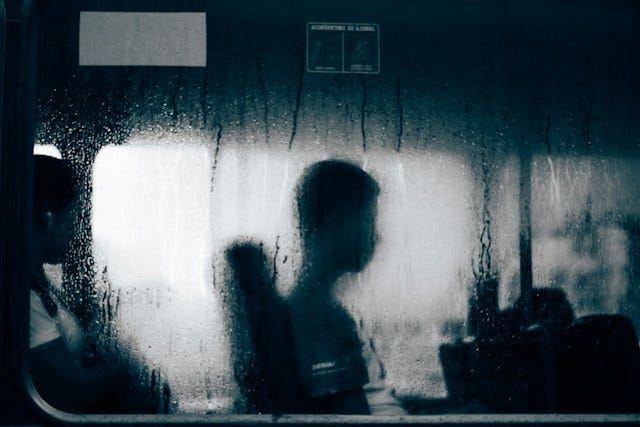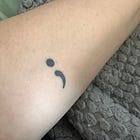Depression: A Black Dog? An Elephant? A rider on the bus I navigate through life
Why this metaphor makes sense and how I deal with Depression when it is waiting at one of my regular stops, wanting to get on for a ride

Depression: “The Black Dog”
You see, as Emma mentions, it’s often called The Black Dog. Typically, this reference is originally attributed to Winston Churchill, although other sources will say Dr. Samuel Johnson was the first to use the term and still others will argue for much more historical references including Homer in 65 BC. It’s a term that’s been widely popularized, many people know what it means, and you can find references to it in literature, music, art, education and elsewhere.
Despite that, there are many who will also argue against using this metaphor for a whole variety of reasons. It’s got a problematic racist connotation, just for starters. Some people also have concerns about the impact of the metaphor on adoption potential for actual black dogs in shelters.
For me, personally, it’s just that it’s not something that resonates. I’m a dog lover whose first dog as an adult was an all black dog that I only remember with warm and fuzzy feelings. Her name was literally Fuzzy. That’s not been my experience of depression.
Emma’s Elephant
Emma shares why for her depression is an elephant, even though she loves elephants, which is essentially about the weight of the experience. That I can certainly relate to. She explains that a lot better than I do. Again, read her piece.
I Drive a Bus and Depression Is One of My Regular Riders
So, it all got me thinking - what animal would I use to describe my experience of depression? And I couldn’t think of one. Ultimately, it doesn’t make sense to me to consider it an animal. But what came to mind was this: if I am a bus driver making my regular routes through life, then Depression is one of my regular riders that appears on the bus now and then.

I’m just doing my route, day in and day out, doing my job, sometimes with joy, sometimes without, often just neutral, right? And passengers are getting on and off the bus at every stop, every day. Some are strangers I’ll never see again. But many are regulars. A lot of those regulars are pretty neutral - we recognize one another with a mutual nod and go about our days. Hunger is usually like that for me. Hunger shows up every day without getting a huge reaction from me. I say hi, I feed it, it finishes its ride, it leaves, it gets on again later in the day. (Sometimes hunger is complicated by all kinds of other things but let’s just leave the metaphor like that for now.)
So then there’s Depression. I live with double depression so I have recurring bouts of major depression.
So, I’m driving my bus around life day in and day out and persistent depression is just kind of there with me. Perhaps, arguably, it is even the bus itself. But then there’s major depression, the more intense thing that shows up now and then. It’s not a daily rider with a regular commute. But it has lived in my neighborhood since I was a child and it regularly appears at one of my stops. Sometimes it shows up at a stop I didn’t anticipate and really throws me off guard. Usually it’s relatively predictable, like how you know that you need to turn your windshield wipers on in the rain, you know this passenger is probably showing up after certain conditions present themselves.

In any case, I am there, going about my daily work, and I see Depression at the bus stop. I can (and have) reacted in all kinds of ways. For example, I have refused to stop and pick it up (basically, this was me trying to outrun depression, and unfortunately I learned it’s going to show up at another stop whether I like it or not.) I can let it on and pretend it’s not there. Usually if I do that, it becomes a really noisy passenger that disrupts my work and sometimes causes traffic accidents. I can let it get on, attack me, hold me down and take over driving the bus. Which typically results in having to call in security (therapists, psychiatrists, friends, etc.) before the issue gets resolved.
Or, I can think to myself, “oh you again?” - sometimes with relative ease, sometimes with complete disgust - and let Depression get on my bus, and ask, “hey how are you today? Where are you going?” In other words, I can be curious about why Depression is back and what it needs from me so that, frankly, it can get back off of my bus.
I’ll have to keep mulling it over because I think there’s more to it than exactly this but that’s the metaphor I was inspired to begin exploring after reading Emma’s piece. For fun creative background, I was originally thinking not of a bus but rather a taxi or Lyft. However, those cars don’t typically have regular repetitive routes and actual life is more like a regular route - sometimes you get changed to a different bus route or you change cities and learn a new route but most of life is a regular route.
And another fun fact: I initially was phrasing this as Depression being a passenger on my bus but when I wrote the title using that word, it sounded way too much like Dexter’s Dark Passenger to me so I felt compelled to change it.
What metaphor, if any, feels right for you right now as it relates to your experience of living with a chronic or recurring condition?
If you read this far, perhaps you liked the work. The work does take work. It only continues with support, so please consider subscribing. My annual rate starts at $10 per year.









Kathryn, this metaphor of the passenger on the bus rings so true for me! I also recently decided to let depression on the bus. To give it to myself. In other words - Im allowed to have depression. I don't have to be perfect all the time. Or happy! Then to say "hello" to depression, let it know that I recognize it. And then listen. And re-frame. Have a conversation.
Since Jan 1st I have been counting days that I have not picked up self hatred, just like I have counted my years without picking up a drink. The realization that I pick up depression as a drug to change my mood was pretty life-changing. It doesn't mean depression doesn't show up, but it means I can talk to it, not allow it to rule me.
If I cant do anything to lessen the blow. I can submit with wisdom. I am allowed to have a day off, a day where I can't get out of bed. I give it to myself as a gift.
Hi, Kathryn. Thanks for sharing this very vulnerable account. I learned some things about you that I was unaware of. Know that I will always be one of your biggest fans. Keep hope alive my friend. Peace